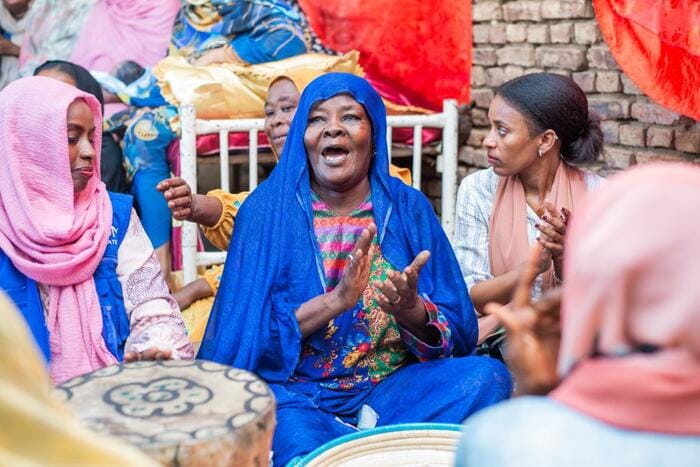Sudan's Silent Heroes: Empowering Women Amidst Conflict and Displacement - Sudan

Source: ReliefWeb
Sudan - For the past ten years, Naama* has been running a women-led local organization in Sudan focusing on addressing gender-based violence (GBV) and promoting the empowerment of women. As one of the organizations that focuses on offering protection services for people in vulnerable situations, she reflects on the journey and what it means to offer these services amidst the ongoing fighting.
"I am displaced."
"Unfortunately, this is nothing unusual in Sudan. Before the conflict started in April 2023, nearly four million Sudanese were already displaced due to conflict in Darfur and the impacts of climate change. Cynically, one might say that displacement has become part of our daily lives and is deeply ingrained in our recent history. Before my career in the humanitarian sector, I read about all those numbers and phenomena in my textbooks at school and university. However, I only started to grasp the magnitude of all this once I worked with internally displaced Sudanese. In April 2023 when the fighting broke out, I ultimately realized what 'being' displaced means: I had to flee with my 70-year-old father and my son from Khartoum."
Yet despite this, Naama has remained unbowed in her passion to champion for the empowerment of women and address GBV within her community.
"I am a leader."
"Finding myself displaced never meant that I would pause or stop the work of our organization. I never thought about that for even a second. Because all those women, girls, vulnerable men, and boys still need our support. My personal tragedy should not and did not hinder me from caring; it instead made it more pressing to me."
Alongside her team, Naama ensured that they continued providing assistance.
"Of course, any conflict is always negative and destructive. But surprisingly enough, I also found positive things amidst all this chaos. It sharpened my view of what we can do to make change happen. And this may be needed. When you are an executive director, your typical day looks rather bureaucratic - as many administrative, logistical, and strategic things need to be taken care of. This sometimes means you are not focused on the daily work and operations in the field. Now that I work both inside and outside Sudan, I shed the boss title immediately, roll up my sleeves and work hand in hand with my team on the ground."
As an organization, their mission has always been clear, but now they are even more aware of what needs to be done: to build community resilience, enhance community-based protection mechanisms by building on local positive coping mechanisms and provide specialized protection assistance especially for women and girls who have been affected by the conflict. Protection is at the core of the organization's work.
During the conflict, community-based protection structures proved to be the most accessible, providing immediate support to survivors in recent conflicts. The community committees had access to and direct interaction with communities, hence successfully and actively responded, and helped GBV survivors evacuate when access was proven limited by the sustained fighting.
"I am a woman."
"I have always considered myself a strong woman. However, working with our community committees, I got to know many impressive, strong women. I learned a lot from them. And not just me. The world can learn from them."
To Naama, the women and girls they assist are more than numbers, but rather, their stories are the heartbeat of their mission. "For me, the biggest reward is to hear 'Thank you' from a woman who we supported. Instances such as this one make me realize the importance and relevance of our work. It makes me keep going as a head of the organization, as a woman."
"I am a Sudanese."
While her work carries those moments of reward and gratification, this is only one part of the story. But there is also the harsh reality that many women choose to flee not because of the fear of clashes, but the fear of being sexually assaulted. As highlighted by the High Commissioner for Human Rights, sexual violence as a weapon of war, including rape, has been a defining - and despicable - characteristic of the crisis since the beginning.
"It is frustrating. And it hurts to see. But we must admit that fighting GBV at the societal level is beyond our organization's capacity and requires collective efforts. It requires more support to local organizations like ours. We are doing our part. But ultimately, protection is a process - we must address cultural and social norms," adds Naama.
"These challenges and frustrations don't upset us but fuel our determination. As women of Sudan, we are stronger than them; we will overcome them, we will. I will."
"I am a dreamer."
This sort of fierce determination has always been part of Naama. Having started the organization in a small apartment that her mother provided, it took sheer commitment, passion and dedication to grow it into what it is now. Through it all, she remains indebted to her mother - her biggest supporter - for the endless source of inspiration.
"I come from a humanitarian family where both of my parents devoted their lives to helping others. Serving our communities has always been our purpose...our legacy. That is why I will always continue my work until I can't."
"My hope for the future is a safer, more peaceful Sudan, marked by positive changes for women, children, and the entire nation."
Local organizations like Naama's frequently bear the brunt of response efforts with limited funding. However, the challenges are significantly greater for women-led organizations engaged in sensitive and risky work. These organizations face more difficulties in accessing support, gaining priority, and executing their missions effectively. IOM continues to support women-led organizations to help address the increasing protection needs in Sudan.
This story shared by Naama was written by Olga Borzenkova, Communications Officer.
